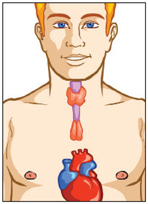Endocrine Myopathies
Hyperthyroid and Hypothyroid Myopathies
 Hyperthyroid myopathy
Hyperthyroid myopathy
What is hyperthyroid myopathy?
Hyperthyroid myopathy is a muscle disease caused by overproduction of thyroid hormones from the thyroid gland. It is not inherited.
What are the symptoms of hyperthyroid myopathy?
This disease commonly involves weakness and wasting of muscles around the shoulders and sometimes the hips. There also can be weakness in muscles of the face and throat, and in the respiratory muscles. Life-threatening cases can cause rhabdomyolysis (acute muscle breakdown).
Some people with hyperthyroid myopathy develop Grave’s disease, damage to muscles that control movement of the eye and eyelids, which can lead to vision loss. Others develop thyrotoxic periodic paralysis, which involves temporary but profound attacks of muscle weakness in association with low serum potassium.
What causes hyperthyroid myopathy?
Overproduction of thyroid hormones, known as thyroxine, by the thyroid gland causes hyperthyroid myopathy. A common cause of this disorder is autoimmunity, a condition in which the immune system turns against part of the body — in this case, the thyroid gland. Although hyperthyroid myopathy is not inherited, there appears to be a genetic predisposition to autoimmune diseases. See Causes/Inheritance.
What is the progression of hyperthyroid myopathy?
Average onset of hyperthyroid myopathy is in the 40s. The disease can usually be alleviated by restoring normal thyroxine levels through medication or surgery. See Medical Management.
Hypothyroid myopathy
What is hypothyroid myopathy?
Hypothyroid myopathy is a muscle disease caused by deficient hormone production from the thyroid gland. It is not inherited.
What are the symptoms of hypothyroid myopathy?
The most common symptoms include weakness around the hips and sometimes the shoulders, and a slowing of reflexes. Some people also experience muscle stiffness and painful muscle cramps. LIfe-threatening cases can cause rhabdomyolysis (acute muscle breakdown). Sometimes, the disease causes muscle enlargement along with muscle weakness.
What causes hypothyroid myopathy?
Underproduction of thyroid hormones, known as thyroxine, by the thyroid gland causes hypothyroid myopathy. A common cause of this disorder is autoimmunity, a condition in which the immune system turns against part of the body — in this case, the thyroid gland. Although hypothyroid myopathy is not inherited, there appears to be a genetic predisposition to autoimmune diseases. See Causes/Inheritance.
What is the progression of hypothyroid myopathy?
This disease has its onset in childhood or adulthood. It can be almost completely alleviated by restoring normal thyroxine levels through medication. See Medical Management.

